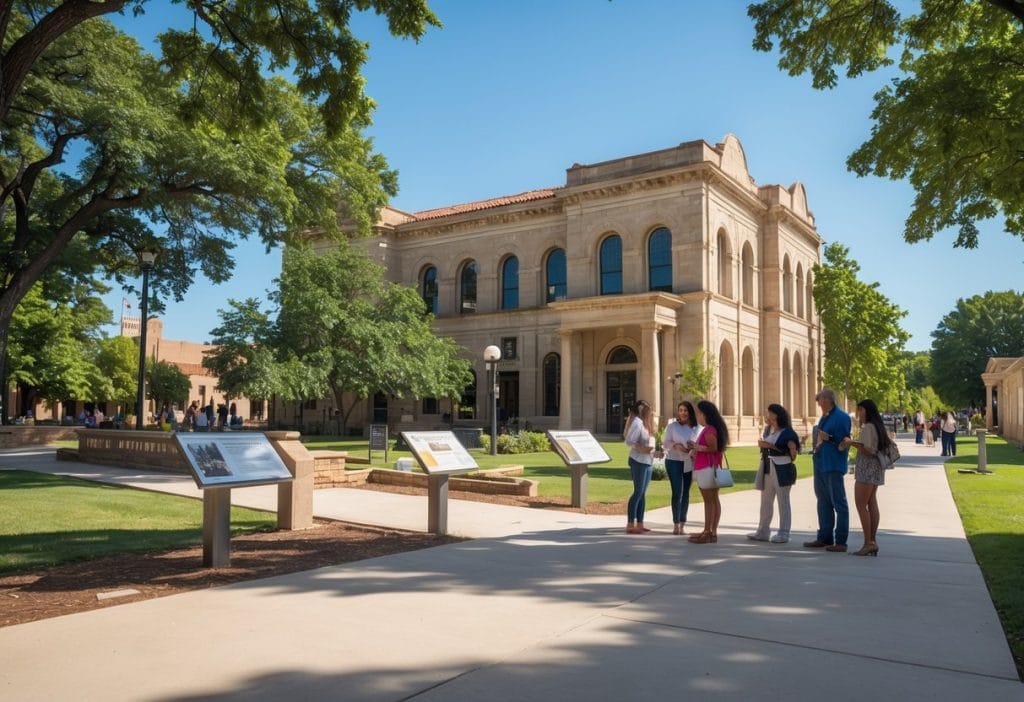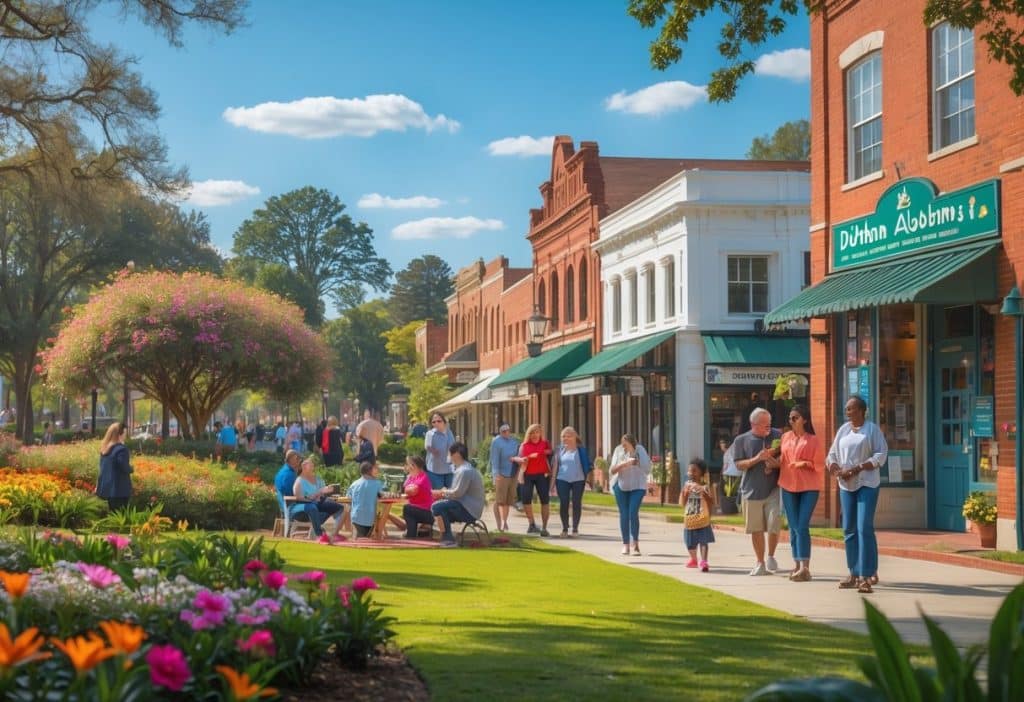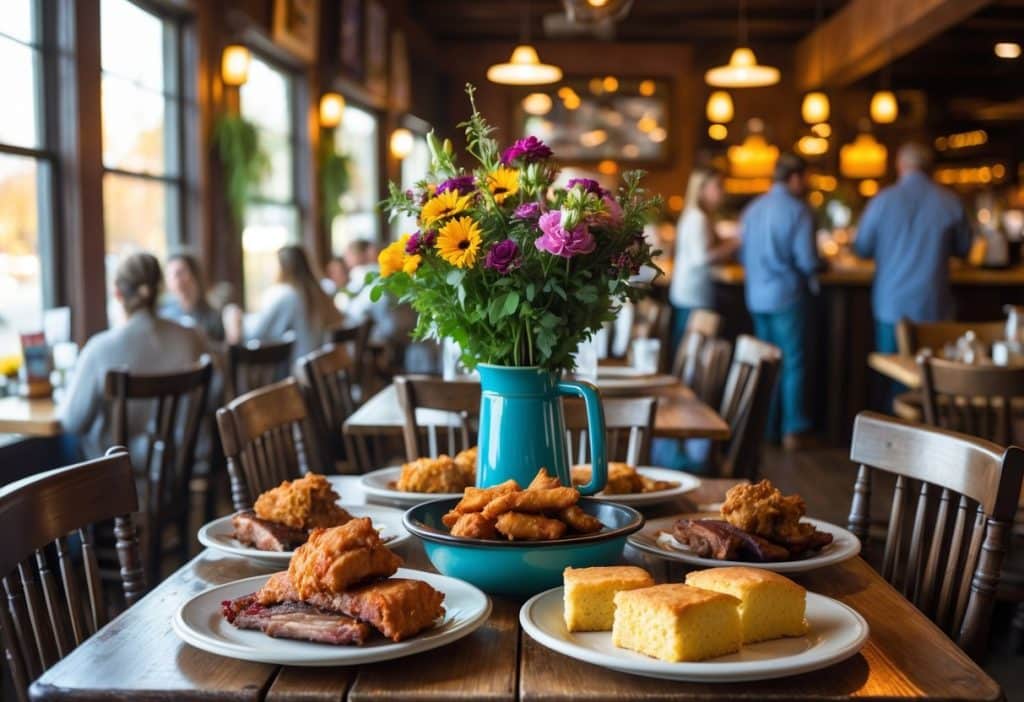Historic Sites and Museums
Tulsa offers a variety of places that tell its unique story through artifacts, exhibits, and landmarks. Visitors can explore collections that focus on local history, cultural resilience, and famous highways that shaped the city’s growth.
The Tulsa Historical Society & Museum
The Tulsa Historical Society & Museum preserves Tulsa’s past through eight rotating exhibit galleries. It covers topics like the oil boom and local culture. Visitors can see artifacts, photographs, and documents that bring the city’s history to life.
The museum also features the Vintage Gardens and the Five Moons sculpture, which honors Native American ballerinas. It provides a clear look at Tulsa’s transformation from a small town to a cultural hub. Admission details and current exhibits are available online at the Museum of Tulsa History.
Greenwood District Legacy
The Greenwood District is a vital site for understanding Tulsa’s Black history. Once a thriving business and cultural center, it was destroyed during the 1921 Tulsa Race Massacre. Today, Greenwood Rising offers an interactive museum to honor this history and the community’s resilience.
The district has been revitalized with new businesses, museums, and cultural spaces. It stands as an important symbol of recovery and strength, providing visitors with a meaningful connection to Tulsa’s complex past. More info can be found at the Historic Greenwood District.
Route 66 Landmarks
Tulsa’s stretch of Route 66 includes several landmarks that highlight the city’s role in early automobile travel and commerce. Historic bridges, vintage neon signs, and classic diners create a nostalgic experience for visitors.
Notable sites along this route reflect Tulsa’s growth in the mid-20th century and offer photo opportunities. Exploring Route 66 is a chance to see how Tulsa connected with the rest of the country. Details about these landmarks can be found through resources on Route 66 history in Tulsa.
Architectural and Cultural Heritage
Tulsa’s buildings and landmarks show its past and culture in clear ways. The city blends styles from the early 20th century oil boom with deep roots in Native American history. Visitors can see this mix in carefully preserved streets, churches, and theaters.
Art Deco Landmarks
Tulsa is famous for its Art Deco architecture, a style that grew during the oil boom in the 1920s and 1930s. Key buildings include the Philtower, the Pythian Building, and the Boston Avenue Methodist Church. These structures feature bold geometric shapes, sunburst patterns, and rich ornamentation.
Walking tours through the Historic Art Deco District highlight the city’s skyline from this period. The Petroleum Building and several other skyscrapers show off classic Art Deco design. Many buildings are open to the public for guided or self-guided tours.
This style marks Tulsa’s growth as an oil city and remains a central part of its identity. Art lovers and history buffs often visit to see how Tulsa shaped this American architectural movement. More details on Tulsa’s Art Deco heritage can be found at Art Deco Tulsa’s site.
Historic Churches and Buildings
Tulsa’s historic churches provide insight into its cultural and religious roots. The Boston Avenue Methodist Church is an Art Deco masterpiece known for its spire and stained glass. It’s listed on the National Register of Historic Places for architectural and cultural significance.
Other notable buildings include the Greenwood Cultural Center, which reflects Tulsa’s African American history and resilience, especially related to the Greenwood District, once called Black Wall Street. The Cain’s Ballroom also ties into early Tulsa history as a music and community gathering spot.
These buildings highlight Tulsa’s diverse population and evolving social fabric. They connect visitors to important stories about faith, race, and community life across the city’s history.
Iconic Theaters and Venues
Tulsa has several historic theaters that still host concerts, performances, and events. The Cain’s Ballroom is famous for its role in country music and rock history. It was a key venue in the development of Western Swing in the 1930s and continues to attract well-known artists.
The Tulsa Theater, also called the Riverview Theatre, showcases classic 20th-century design with an interior that reflects Tulsa’s booming 1920s era. It operates as a community hub for independent films and live shows.
Other venues, such as the Brady Theater, offer a look at Tulsa’s entertainment culture through the decades. These theaters maintain historic character while serving modern audiences, making them key stops for anyone interested in Tulsa’s cultural heritage.
Influential People and Key Events
Tulsa’s history is shaped by individuals who influenced its growth and events that changed its course. Leaders from different periods, from the oil boom to modern times, left lasting marks on the city’s culture and economy. Key moments, including social struggles, also define Tulsa’s path.
Oil Boom Era Personalities
During the early 20th century, Tulsa became known as the “Oil Capital of the World.” Several business leaders played crucial roles in this rise. Individuals like J. Paul Getty and Harry Sinclair were instrumental in developing Tulsa’s oil industry, bringing wealth and jobs to the city.
These men built companies that expanded oil production and refining. Their investments led to rapid urban growth with new infrastructure and cultural institutions. While they enriched Tulsa’s economy, their influence also created social divides between the wealthy and working class.
The legacy of these leaders still affects Tulsa. Their names appear on landmarks, charities, and museums dedicated to the city’s oil heritage.
Tulsa Race Massacre Impact
In 1921, Tulsa faced a tragic event known as the Tulsa Race Massacre. This violent attack destroyed Black Wall Street, a prosperous Black neighborhood in Greenwood. Over 1,000 homes and businesses were burned down, displacing thousands.
The massacre deeply affected Tulsa’s social fabric and economy. It halted Black-owned business growth and strained race relations for decades. Survivors faced injustice and a lack of acknowledgment until recent years.
Efforts to recognize this history have increased, including educational programs and memorials. The event remains a critical part of Tulsa’s story, reminding residents of struggles faced in pursuit of equality.
Notable Innovators of Tulsa
Tulsa’s modern reputation includes innovators in business, arts, and education. Leaders in technology and culture have helped diversify the city beyond its original oil roots.
People like Oral Roberts made an impact in religious broadcasting and education. Others have contributed to Tulsa’s growing status as a center for arts and entrepreneurship, encouraging new industries.
This wave of innovators fosters collaboration across sectors. They build on Tulsa’s history while opening paths for future growth, reflecting a shift toward a dynamic and inclusive economy.
For more on Tulsa’s people and events, explore the 25 Tulsans who shaped our city.
Storage Unit Rentals in Tulsa, OK
Tulsa offers many options for self storage rentals to meet different needs. Units range from small spaces around 5’x5′ to larger ones like 10’x20′ that can hold furniture or even motorcycles. Prices vary depending on size, location, and amenities.
Common features include climate control, 24/7 access, and security measures. Climate-controlled units in Tulsa average about $127 per month, while non-climate units can start near $91. Ground floor units or those with electrical outlets tend to cost more.
Some storage facilities offer flexible leases and free truck use for moving. Prices can be as low as $1 for the first month at certain Tulsa locations.
Iron Storage provides storage unit rentals across Tulsa with a range of unit sizes and convenient online booking options.
| Unit Size | Typical Use | Average Price (Monthly) |
|---|---|---|
| 5’x5′ | Boxes, small items | From $11 |
| 10’x10′ | Bedroom furniture, small appliances | Around $91 |
| 10’x20′ | Large items, small vehicles | $150 to $300 |
For more details or to compare units in Tulsa, check Tulsa’s self storage listings online. Many facilities let renters reserve units quickly and easily.








